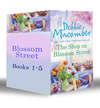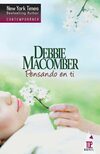Loe raamatut: «Blossom Street Bundle»
Blossom Street Bundle (Books 1-5)
The Shop on Blossom Street
A Good Yarn
Susannah’s Garden
Christmas in Seattle
Back on Blossom Street
Debbie Macomber
About the Author
When DEBBIE MACOMBER first decided to write a novel, people called her a hopeless dreamer. As a young, dyslexic mother of four active children, no one believed she had what it took to write a book, except Debbie. She wrote—for years. But each time she completed a story and mailed it off to a publisher, the manuscript was returned, stamped “rejected.” As tough as it was to keep her spirits alive, Debbie never gave up.
But all her perseverance paid off and Debbie’s heartwarming novels have made her a New York Times bestselling author with sales of over 51 million novels worldwide.
The Shop on Blossom Street
Debbie Macomber
To Linda Johnson for sharing her love
of knitting with me.
To Laura Early for taking me under her wing.
And to Lisa, who touched my heart in her
desire for a child.
1
CHAPTER
“The yarn forms the stitches, the knitting forges the friendships, the craft links the generations.”
—Karen Alfke, “Unpattern” designer and knitting instructor
LYDIA HOFFMAN
The first time I saw the empty store on Blossom Street I thought of my father. It reminded me so much of the bicycle shop he had when I was a kid. Even the large display windows, shaded by a colorful striped awning, were the same. Outside my dad’s shop, there were flower boxes full of red blossoms—impatiens—that spilled over beneath the large windows. That was Mom’s contribution: impatiens in the spring and summer, chrysanthemums in the fall and shiny green mistletoe at Christmas. I plan to have flowers, too.
Dad’s business grew steadily and he moved into increasingly larger premises, but I always loved his first store best.
I must have astounded the rental agent who was showing me the property. She’d barely unlocked the front door when I announced, “I’ll take it.”
She turned to face me, her expression blank as if she wasn’t sure she’d heard me correctly. “Wouldn’t you like to see the place? You do realize there’s a small apartment above the shop that comes with it, don’t you?”
“Yes, you mentioned that earlier.” The apartment worked perfectly for me. My cat, Whiskers, and I were in need of a home.
“You would like to see the place before you sign the papers, wouldn’t you?” she persisted.
I smiled and nodded. But it wasn’t really necessary; instinctively I knew this was the ideal location for my yarn shop. And for me.
The one drawback was that this Seattle neighborhood was undergoing extensive renovations and, because of the construction mess, Blossom Street was closed at one end, with only local traffic allowed. The brick building across the street, which had once been a three-story bank, was being transformed into high-end condos. Several other buildings, including an old warehouse, were also in the process of becoming condos. The architect had somehow managed to maintain the traditional feel of the original places, and that delighted me. Construction would continue for months, but it did mean that my rent was reasonable, at least for now.
I knew the first six months would be difficult. They are for any small business. The constant construction might create more obstacles than there otherwise would have been; nevertheless, I loved the space. It was everything I wanted.
Early Friday morning, a week after viewing the property, I signed my name, Lydia Hoffman, to the two-year lease. I was handed the keys and a copy of the rental agreement. I moved into my new home that very day, as excited as I can remember being about anything. I felt as if I was just starting my life and in more ways than I care to count, I actually was.
I opened A Good Yarn on the last Tuesday in April. I felt a sense of pride and anticipation as I stood in the middle of my store, surveying the colors that surrounded me. I could only imagine what my sister would say when she learned I’d gone through with this. I hadn’t asked her advice because I already knew what Margaret’s response would be. She isn’t—to put it mildly—the encouraging type.
I’d found a carpenter who’d built some cubicles for me, three rows of them, painted a pristine white. Most of the yarn had arrived on Friday and I’d spent the weekend sorting it by weight and color and arranging it neatly in the cubicles. I’d bought a secondhand cash register, refinished the counter and set up racks of knitting supplies. I was ready for business.
This should have been a happy moment for me but instead, I found myself struggling to hold back tears. Dad would’ve been so pleased if he could have seen what I’d done. He’d been my support and my source of strength, my guiding light. I was so shocked when he died.
You see, I’d always assumed I would die before my father.
Most people find talk of death unsettling, but I’ve lived with the threat of it for so long, it doesn’t have that effect on me. The possibility of death has been my reality for the last fourteen years, and I’m as comfortable talking about it as I am the weather.
My first bout with cancer came the summer I turned sixteen. I’d gone to pick up my driver’s license that day in August. I’d successfully passed both the written and the driving tests. My mother let me drive from the licensing office to the optometrist. It was supposed to be a routine appointment—I was having my eyes examined before the start of my junior year of high school. I had big plans for the day. As soon as I got home from the eye doctor’s, Becky and I were going to drive to the beach. It would be the first time I’d taken the car out by myself, and I was looking forward to driving without my mom or dad or my older sister.
I recall being upset that Mom had scheduled the eye appointment right after my driving test. I’d been having some problems with headaches and dizzy spells, and Dad thought I might need reading glasses. The idea of showing up at Lincoln High School wearing glasses bothered me. A lot. I was hoping Mom and Dad would agree to let me wear contact lenses. As it turned out, impaired vision was the least of my worries.
The optometrist, who was a friend of my parents, seemed to spend an inordinate amount of time staring into the corner of my eye with this horribly bright light. He asked a lot of questions about my headaches. That was almost fifteen years ago, but I don’t think I’ll ever forget the look on his face as he talked to my mother. He was so serious, so somber … so concerned.
“I want to make Lydia an appointment at the University of Washington. Immediately.”
My mother and I were both stunned. “All right,” my mother said, glancing from me to Dr. Reid and back again. “Is there a problem?”
He nodded. “I don’t like what I’m seeing. I think it would be best if Dr. Wilson had a look.”
Well, Dr. Wilson did more than look. He drilled into my skull and removed a malignant brain tumor. I say those words glibly now, but it wasn’t a quick or simple procedure. It meant weeks in the hospital and blinding, debilitating headaches. After the surgery, I went through chemotherapy, followed by a series of radiation treatments. There were days when even the dimmest of lights caused such pain it was all I could do not to scream in agony. Days when I measured each breath, struggling to hold on to life because, try as I might, I could feel it slipping away. Still, there were many mornings I woke up and wished I would die because I couldn’t bear another hour of this. Without my father I’m convinced I would have.
My head was completely shaved and then, once my hair started to grow back, it fell out again. I missed my entire junior year and when I was finally able to return to high school, nothing was the same. Everyone looked at me differently. I didn’t attend the Junior-Senior prom because no one asked me. Some girlfriends suggested I tag along with them, but out of false pride I refused. In retrospect it seems a trivial thing to worry about. I wish I’d gone.
The saddest part of this story is that just when I was beginning to believe I could have a normal life—just when I believed all those drugs, all that suffering had served a useful purpose—the tumor grew back.
I’ll never forget the day Dr. Wilson told us the cancer had returned. But it’s not the expression on his face that I remember. It’s the pain in my father’s eyes. He, above anyone, understood what I’d endured during the first bout of treatment. My mother doesn’t deal well with illness, and Dad was the one who’d held me together emotionally. He knew there was nothing he could do, nothing he could say, that would lessen this second ordeal for me. I was twenty-four at the time and still in college, trying to accumulate enough credits to graduate. I never did get that degree.
I’ve survived both bouts of cancer, and I’m definitely not the carefree girl I once was. I appreciate and treasure every single day because I know how precious life is. Most people assume I’m younger than thirty but they seem to find me more serious than other women my age. My experience with cancer means I don’t take anything, least of all life itself, for granted. I no longer greet each day with careless acceptance. But I’ve learned there are compensations for my suffering. I know I’d be a completely different person if not for the cancer. My dad claimed I achieved a certain calm wisdom, and I suppose I have. Yet in many ways I’m naive, especially when it comes to men and relationships.
Of all the compensations, the one I’m most grateful for is that while undergoing treatment I learned to knit.
I may have survived cancer twice, but unfortunately my father didn’t. My second tumor killed him. That’s what my sister Margaret believes. She’s never actually said so, but I know it’s what she thinks. The truth is, I suspect she’s probably right. It was a heart attack, but he aged so much after that second diagnosis I’m sure it affected his health. I knew that if he could’ve switched places with me, he would have done it gladly.
He was at my bedside as much as possible. That, in particular, is what Margaret can’t seem to forgive or forget—the time and devotion Dad gave me throughout this ordeal. Mom, too, as much as she was emotionally able.
Margaret was married and a mother of two before the second tumor was even discovered. Nevertheless, she seems to assume that she’s somehow been cheated because of my cancer. To this day, she acts as if being sick was my choice, an option I preferred over a normal life.
It goes without saying that my sister and I have a strained relationship. For Mom’s sake, especially now that Dad’s gone, I try my best with Margaret. She doesn’t make it easy. She can’t hide her resentment, no matter how many years it’s been.
Margaret was against my opening a yarn shop, but I sincerely doubt she would’ve encouraged me in any undertaking. I swear, her eyes brightened at the prospect of seeing me fail. According to the statistics, most new businesses do go under—usually within a year—but I still felt I had to give the yarn shop a chance.
I had the funds. The money was actually an inheritance I received from my maternal grandmother who died when I was twelve. Dad invested it wisely and I had a small nest egg. I should have probably saved it for what Mom calls a “rainy day,” but it’s been raining every day since I turned sixteen and I was tired of holding on to it. Deep down, I know Dad would approve.
As I said, I learned to knit while undergoing chemotherapy. Over the years I’ve become an accomplished knitter. Dad always joked that I had enough yarn to open my own store; recently I decided he was right.
I love to knit. There’s a comfort to it that I can’t entirely explain. The repetition of weaving the yarn around a needle and then forming a stitch creates a sense of purpose, of achievement, of progress. When your entire world is unraveling, you tend to crave order, and I found it in knitting. In fact, I’ve even read that knitting can lower stress more effectively than meditation. And I guess for me it was a better approach, because there was something tangible to show for it. Maybe because knitting gave me a sense of action, of doing something. I didn’t know what tomorrow held, but with a pair of needles in my hands and a ball of yarn in my lap, I was confident I could handle whatever lay ahead. Each stitch was an accomplishment. Some days all I could manage was a single row, but I had the satisfaction of that one small achievement. It made a difference to me. A very big difference.
Over the years I’ve taught a number of people how to knit. My first students were other cancer patients going through chemotherapy. We met at the Seattle Oncology Center, and before long, I had everyone, men included, knitting cotton washcloths. I think every doctor and nurse in that clinic has enough knit washcloths to last a lifetime! After washcloths, I had my band of beginning knitters move on to a small afghan. Certainly I’ve had some failures but far more successes. My patience was rewarded when others found the same serenity I did in knitting.
Now I have my own shop and I think the best way to get customers in the door is to offer knitting classes. I’d never sell enough yarn to stay in business if I ran classes in washcloths, so I’ve chosen a simple baby blanket to start with. The pattern’s by one of my favorite designers, Ann Norling, and uses the basic knit and purl stitches.
I don’t know what to expect of my new venture, but I’m hopeful. Hope to a person with cancer—or to a person who’s had cancer—is more potent than any drug. We live on it, live for it. It’s addictive to those of us who’ve learned to take one day at a time.
I was making a sign advertising my beginners’ class when the bell above the door chimed. My first customer had just walked in and I looked up with a smile on my face. The pounding excitement in my heart quickly died when I realized it was Margaret.
“Hi,” I said, doing my best to sound happy to see her. I didn’t want my sister showing up on my very first morning and attacking my confidence.
“Mom told me you’d decided to go ahead with this idea of yours.”
I didn’t respond.
Frowning, Margaret continued. “I was in the neighborhood and thought I’d stop by and see the shop.”
I gestured with one arm and hated myself for asking. “What do you think?” I didn’t bother to mention that Blossom Street was decidedly out of her way.
“Why’d you name it A Good Yarn?”
I’d gone over dozens of shop names, some too cute by half, some plain and ordinary. I love the idea that “spinning a yarn” means telling a story, and sharing stories with people, listening to their experiences, is important to me. Another legacy of the clinic, I suppose. A Good Yarn seems like a warm and welcoming name. But I didn’t explain all that to Margaret. “I wanted my customers to know I sell quality yarn.”
Margaret shrugged as if she’d seen a dozen knitting shops with more impressive names than mine.
“Well,” I said, despite my determination not to ask again. “What do you think?”
Margaret glanced around a second time, although nothing had changed after her first inspection. “It’s better than I expected.”
I considered this high praise. “I don’t have a large inventory yet, but I’m hoping to build it up over the next year or so. Of course, not all the yarn I’ve ordered has arrived. And there’s more I’m planning to get, some wonderful imports from Ireland and Australia. Everything takes time and money.” In my enthusiasm I’d said more than I intended.
“Are you expecting Mom to help you?” The question was blunt.
I shook my head. “You don’t need to worry. I’m doing this entirely on my own.” So that was the reason for her unannounced visit. Margaret thought I was going to take advantage of our mother. I wouldn’t and the question offended me, but I bit back an angry retort.
Margaret glared at me as if she wasn’t sure I was telling the truth.
“I cashed in my Microsoft stock,” I confessed.
Margaret’s deep brown eyes, so much like my own, nearly doubled in horror at what I’d done. “You didn’t.”
What did my sister think? I had the necessary cash lying around in my bottom drawer? “I had to.” Given my medical history, no bank would grant me a loan. Although I’ve been cancer-free for four years now, I’m viewed as a risk in just about every area.
“It’s your money, I guess.” The way Margaret said it implied I’d made a terrible decision. “But I don’t think Dad would have approved.”
“He would’ve been the first one to encourage me.” I should have kept my mouth shut, but I couldn’t stop myself.
“You’re probably right,” Margaret said with the caustic edge that never failed to appear in our conversations. “Dad couldn’t deny you anything.”
“The money was my inheritance,” I pointed out. I suppose her share is still accruing profit.
My sister walked around the shop, eyeing it critically. Considering Margaret’s apparent dislike of me, I don’t know why my relationship with her is so important, but it is. Mom’s health is fragile and she hasn’t adjusted to life without Dad. Soon, I’m afraid, it’ll be only Margaret and me. The thought of not having any family at all terrifies me.
I’m so grateful not to know what the future holds. I once asked my father why God wouldn’t just let us know what tomorrow would bring. He said that not knowing the future is actually a gift because if we knew, we wouldn’t take responsibility for our own lives, our own happiness. As with so much else in life, my dad was right.
“What’s your business plan?” Margaret asked.
“I—I’m starting small.”
“What about customers?”
“I’ve paid for an ad in the Yellow Pages.” I didn’t mention that the new phone directory didn’t come out for another two months. No need to hand Margaret any ammunition. I’d distributed flyers in the neighborhood, too, but I didn’t know how effective that would be. I was counting on word of mouth to generate customer interest and, ultimately, sales. Which was something else I didn’t mention.
My older sister snickered. I’ve always hated that scoffing sound and had to grit my teeth in order to hide my reaction.
“I’m just getting ready to post a sign for my first knitting class.”
“Do you seriously think a handmade sign taped in the window is going to draw people into your store?” Margaret demanded. “Parking is a nightmare out there and even when the street’s open again, you can’t expect much traffic through this construction mess.”
“No, but—”
“I wish you well, but—”
“Do you?” I asked, cutting her off. My hands shook as I walked over to the display window and secured my notice for knitting classes.
“What’s that supposed to mean?”
I turned to face my sister who, at five foot six, stood a good three inches taller than me. She outweighed me by about twenty pounds, too. Looking at us now, I wonder if anyone would guess we were related and yet when we were small we resembled each other quite a bit.
“I think you want me to fail,” I said honestly.
“That isn’t true! I came this morning because … because I’m interested in what you’re doing.” Her chin went up a notch as if she was daring me to challenge her again. “How old are you? Twenty-nine, thirty?”
“Thirty.”
“Isn’t it time you cut the apron strings?”
That was blatantly unfair. “I’m trying to do exactly that. I left Mom’s house and I moved into the apartment upstairs. I’ve started my own business, too, and I’d appreciate your support.”
She turned her hands over to display her palms. “Do you want me to buy yarn from you? Is that what you want? You know I don’t knit and have no desire to learn. I much prefer to crochet. And—”
“Just this once,” I said, cutting her off a second time, “couldn’t you think of one nice thing to say?” I waited, silently pleading with her to search inside her heart for at least a token word of encouragement.
My request seemed to be an overwhelming task for Margaret. She faltered for several seconds. “You have a good eye for color,” she finally said. She gestured toward the display of yarn I’d arranged on the table by the door.
“Thank you,” I said, hoping to sound gracious. I didn’t mention that I’d used a color wheel to create the display. Hard as it was for Margaret to offer me praise, I certainly wasn’t going to give her an opportunity to withdraw it.
Had we been closer, I would’ve told her the real reason I’d decided to open a yarn store. This shop was my affirmation of life. I was willing to invest everything I had to make it a success. Like the Viking conqueror who came ashore and burned his ships behind him, I had set my course. Succeed or go under.
As my father might say, I was taking responsibility for a future I couldn’t predict.
The bell above the door chimed again. I had a customer! My first real customer.





















